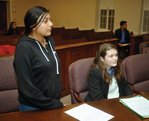





SILER CITY — It’s a Wednesday evening in Siler City, and court is in session.
Elsa Trunnell, a senior at Northwood High School, stands in front of the bench in a black blazer, giving her opening statement as a defense attorney. Sophomores Gabriel Dunk and Kayleigh Smith, from Northwood and the Chatham School of Science and Engineering, respectively, serve as the volunteer prosecution team.
Sound a bit unusual?
This is Chatham County’s Teen Court, a Communities In Schools initiative that has served Chatham County since around 2012. The program allows first-time youth offenders a chance to be sentenced by a jury of other adolescents.
Buy-in from community partners and government officials has allowed the program to continue, and tonight is no exception. A volunteer deputy from the Chatham County Sheriff’s department acts as bailiff, and retired legal worker Patricia Walters volunteers her time as judge. And, though the proceedings this Nov. 13 revolved around a made-up crime to give the participants practice, Teen Court’s community impact looks to be genuine.
“I think it’s important that teenagers know and understand the court system,” teen attorney Smith said, “and it’s a great way to build community.”
Pablo Avendano, Chatham County Teen Court and Community Service Coordinator, works to organize volunteers and find community service opportunities tailored to students. He says that, for many teens, things click into place when they serve on the jury and sentence their peers.
“When you give [students] the power to choose and to decide what the sanctions should be, I think that’s what’s really most effective,” he said.
There are a few key differences between teen court and a typical adult hearing. First, Teen Court takes place at night, two to three times per month. The location switches between Siler City’s courtroom and the Historic Courthouse in Pittsboro, a decision that longtime Teen Court judge Paul Bauer — also a Communities In Schools board member — says is an intentional effort to include all corners of the community.
“We try to keep it a very formal court setting,” Bauer says, “and we have it conducted just like you would see in regular criminal district court. You got the judge, you’ve got a jury, you’ve got attorneys, you’ve got a bailiff …and when they come into the courtroom, you can see a lot of the kids are quite scared; their eyes are opened up quite wide, and they’re nervous.”
The defendants in Teen Court — each of them middle and high school students who have committed minor crimes — have already pleaded guilty for their offenses. Those infractions often include possession of alcohol and other illicit substances, fighting and assault, robbery, property damage or weapon possession. Student attorneys are tasked with explaining mitigating and aggravating factors in the crime, and the jury is responsible for sentencing the defendant.
And finally, the sentences are a bit less intense than might be given to an adult. Typically, the student completes community service hours and mandatory jury duty sessions. But other sanctions — like apology letters, counseling, mediation, essays, observation of District Court and educational seminars — aren’t out of the question. The defendant’s parent or guardian must come with them to court and can usually speak to the jury about their student.
“One thing I try to make sure that the child defendant understands is that their parents are now having to make a significant commitment of their time to bring the child to other Teen Court jury sessions,” Bauer said, “to go and do all the community service, to go to all the educational seminars… I’ve had the kids just not recognize that. It’s almost like the eyes start blinking, they turn around, they look at their parents and didn’t realize that this was going to hurt them, too.”
For many of the student defendants, the formal “court” setting, the presence of engaged peers and traditional court procedures make the experience unforgettable. Walters says that the students on the jury often aren’t afraid to hand out tough sanctions to the defendants.
“The fact that they’re given this responsibility, and they take it so seriously, and they learn from it, and they understand the gravity of what they’re dealing with,” she said. “And they just go through the process, and I just love it.”
Bauer says the program has reduced recidivism rates among high school students. He credits the real-life feel of the proceedings, which Avendano says is “frightening” for some student defendants.
“We’ve had so few kids that go through our Teen court process that go on to do any type of recidivism in the system,” Bauer said. “They have not gone out and committed any other crimes, at least as juveniles, and then we don’t track them beyond that. The program has been so successful in keeping the kids from causing any more problems or committing any more crimes.”
Moving forward, Avendano hopes to see more racial diversity among Teen Court attorneys. He also hopes that more teen defendants will come back after completing their mandatory jury sessions to serve of their own volition.
As for the evening’s attorneys, Trunnell and Dunk both dream of becoming real-life lawyers. Trunnell wants to work in the environmental field, and Dunk seeks to be a corporate attorney. Dunk’s favorite part of Teen Court is when the jury chooses a sentence that closely matches the one he suggests for the defendant. But he’s not too choosy.
“I kind of like all the trials,” Dunk said. “I like the ones that I win, obviously, but I also enjoy learning from the ones that I lose.”